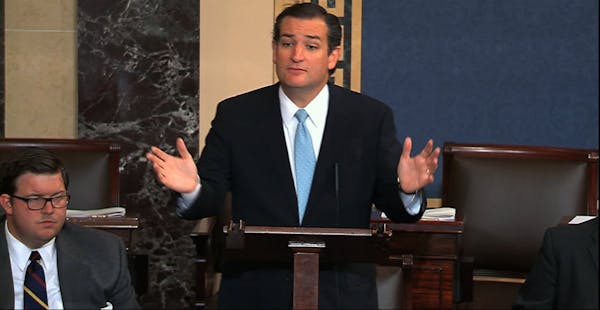During his marathon talk on the U.S. Senate floor, Ted Cruz, R-Texas, turned to history to help persuade his colleagues to support his dream of defunding Obamacare and quiet those saying that it "cannot be done."
Harking back to the 18th century, Sen. Cruz said that had these naysayers been alive then, they would have said, "'This cannot be done. You can't stand up to the British army. … Accept your subjugation. Accept your taxation without representation.' "
Cruz then turned to the Civil War and, finally, to "the 1940s, Nazi Germany," to make his point.
"Look, we saw in Britain, Neville Chamberlain, who told the British people, 'Accept the Nazis. Yes, they'll dominate the continent of Europe but that's not our problem. Let's appease them. Why? Because it can't be done. We can't possibly stand against them.' "
Cruz's statements were not only outrageous, they were inaccurate. Britain responded to the German invasion of Poland on Sept. 1, 1939, within hours, and Chamberlain, the prime minister, declared that the nation was at war with Germany by late morning the following day.
A few days before Cruz spoke, AIG's CEO, Robert Benmosche, compared the 2008 public uproar against bonuses for executives in the financial-services industry to lynchings in the South.
Benmosche said, "[The uproar over bonuses] was intended to stir public anger, to get everybody out there with their pitchforks and their hangman nooses, and all that, sort of like what we did in the Deep South [decades ago]. And I think it was just as bad and just as wrong."
What these comments demonstrate is that our society needs more exposure to history. With science and technology fields championed by politicians and investors alike as the focus in national education, the humanities, including history, have been on the defensive. The humanities, some argue, are irrelevant.
But without them, outrageous and ignorant comments like those uttered by Cruz and Benmosche are frequently left unchallenged. Citizens knowledgeable about history would not only find such comments distasteful; they would be able to marginalize people who utter them, instead of lionizing them for their courage to speak "until [they] can't stand anymore."
--------------
Magda Teter is a professor of history and Jewish studies at Wesleyan University in Middletown, Conn. She wrote this article for McClatchy-Tribune Information Services.
Readers Write: Caucus system, state Sen. Nicole Mitchell, voting for RFK Jr.
Turn off cellphones in state's classrooms
How many hostages are still alive? Hamas doesn't seem to know


